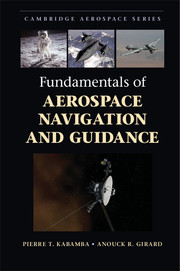Book contents
- Frontmatter
- Dedication
- Contents
- Preface
- 1 Introduction
- 2 Deterministic Systems Theory
- 3 Stochastic Systems Theory
- 4 Navigation
- 5 Homing Guidance
- 6 Ballistic Guidance
- 7 Midcourse Guidance
- 8 Optimization
- 9 Optimal Guidance
- 10 Introduction to Differential Games
- Epilogue
- APPENDIX A Useful Definitions and Mathematical Results
- Bibliography
- Index
8 - Optimization
Published online by Cambridge University Press: 05 October 2014
- Frontmatter
- Dedication
- Contents
- Preface
- 1 Introduction
- 2 Deterministic Systems Theory
- 3 Stochastic Systems Theory
- 4 Navigation
- 5 Homing Guidance
- 6 Ballistic Guidance
- 7 Midcourse Guidance
- 8 Optimization
- 9 Optimal Guidance
- 10 Introduction to Differential Games
- Epilogue
- APPENDIX A Useful Definitions and Mathematical Results
- Bibliography
- Index
Summary
The next two chapters treat optimization and optimal control for the purpose of their application to guidance. Chapter 8 focuses on optimization as a stepping-stone toward optimal control, which is treated in Chapter 9. Optimization is concerned with finding the best option from among several to solve a problem.
Optimization is often necessary in aerospace engineering because of the merciless requirements that physics and chemistry impose on flying systems. For instance, it is well known that to lift 1 kg of payload from Earth's surface to orbit, using chemical rocket propulsion, it is required to use at least 80 kg of rocket structure, engine, fuel, and propellant [78]. This staggering 80/1 ratio is one of many stark reminders that, when it comes to flight, optimization is of the essence.
Throughout this chapter, we discuss necessary and sufficient conditions for optimality. Let us clarify what we mean by these. A necessary condition for optimality is a statement of the form: “If item x is optimal (i.e., is the best), then condition NC(x) must be satisfied.” Typically, condition NC(x) provides enough information to determine x. A sufficient condition for optimality is a statement of the form: “If item x satisfies condition SC(x), then item x must be optimal.” Here also, typically condition SC(x) provides enough information to determine x. In view of these statements, the following caution is in order: necessary conditions guarantee neither optimality of x, nor even existence of a solution to the optimization problem.
- Type
- Chapter
- Information
- Fundamentals of Aerospace Navigation and Guidance , pp. 199 - 221Publisher: Cambridge University PressPrint publication year: 2014

